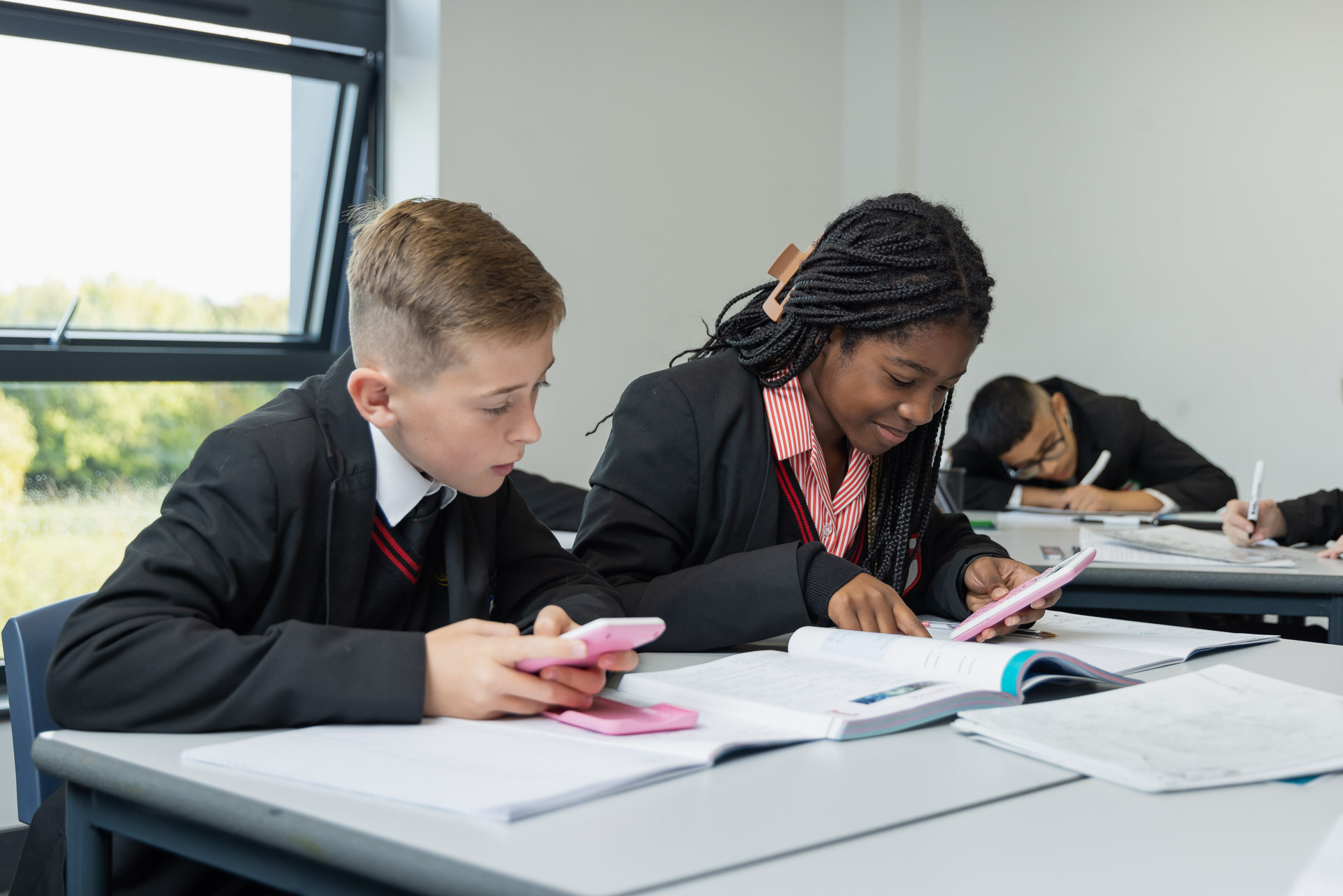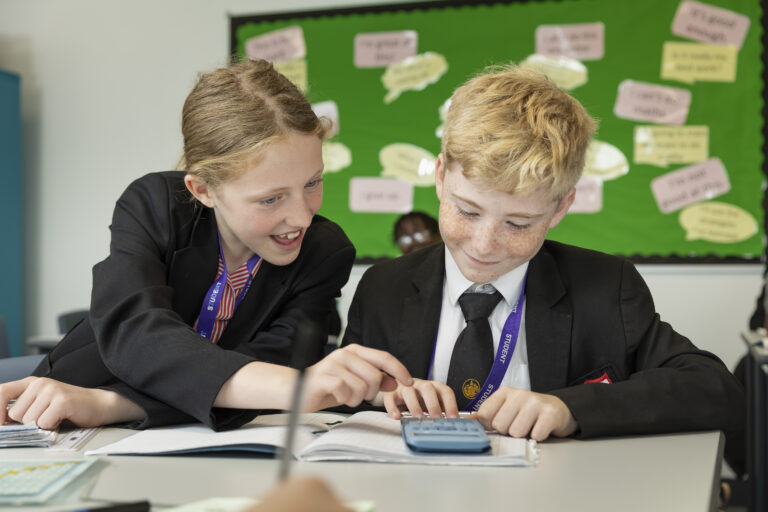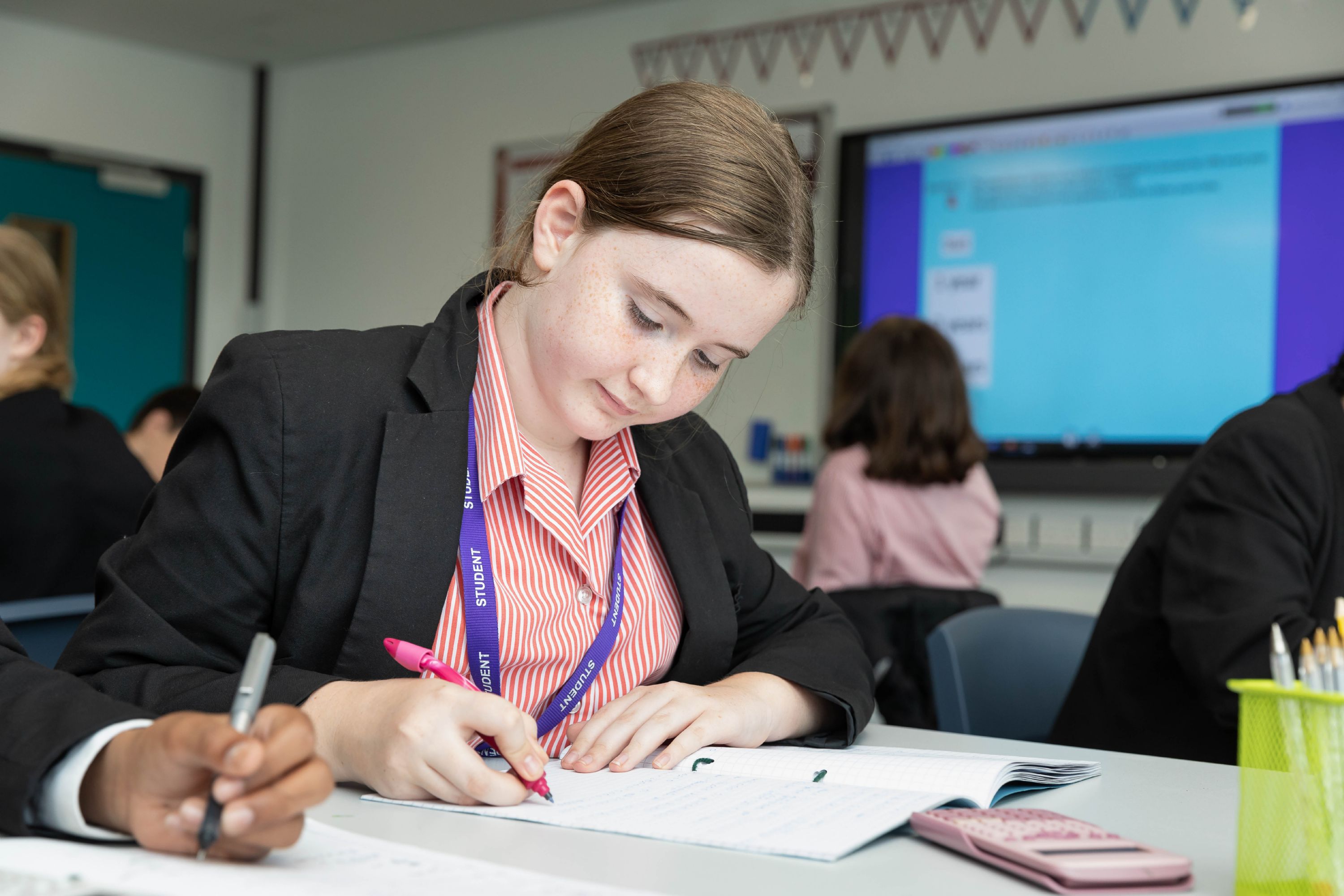Mathematics
Curriculum Leader: Mr E Hargreaves - hargreavese@saintgeorgescofe.kent.sch.uk
Mathematics knows no races or geographic boundaries; for mathematics, the cultural world is one country
David hilbert, German mathematician
Here at Saint George's, we use here and provide personalised support to all our pupils throughout their Mathematic lessons. Having a high-quality mathematics education is an essential part of everyday life and is crucial to providing a foundation for a child’s future.
View our Learning Journey for Mathematics here
Intent
Our curriculum is designed with a mastery approach in mind, key to this is exposing pupils to a variety of representations which reveal the structure of the mathematical ideas and concepts they will encounter, before moving to more abstract methods to gain fluency. We are firm in the belief that all pupils can achieve in mathematics and as such our tasks are designed to develop resilience, inquisitiveness and problem-solving in pupils, helping them to thrive intellectually, culturally and spiritually during their time here.

Implementation

Students are taught through a variety of research-informed strategies where the focus is given to developing conceptual understanding through a progression of concrete, pictorial and abstract representations whilst following a coherently sequenced curriculum. Students are encouraged to engage kinaesthetically with the subject through manipulatives and to develop their verbal communication skills by working collaboratively with others. This range of approaches is designed to ensure that students with a variety of needs are all supported in accessing the material. We are extremely proud to have an over-staffed department of specialist practitioners which allows staff time to plan the delivery of the highest quality for all learners.
We ensure that SEND and disadvantaged children are given the necessary support in class to access the Curriculum fully and that equal opportunities are given to all.
Impact
Our duty as a department extends to supporting and monitoring pupil progress through regular assessment and feedback. Pupils are given low-stakes quizzes fortnightly to ensure past material is encountered regularly and to provide a safe environment where practice can take place under time pressure. Higher stakes assessments, along with teacher judgement, determine the grades we award pupils throughout their time with us. There is one such assessment each term, four of these are focussed on the work completed during that half-term, and two will draw on content from throughout the year to better reflect the structure of a public examination. Our feedback to these assessments aims to explain, succinctly, how a pupil needs to improve to get to the next grade.

Mathematics in Key Stage 3 (KS3)
Per fortnight:
7 lessons in years 7 and 8.
9 lessons in year 9.
All lessons have an embedded collaborative approach using Kagan structures, particularly when developing and embedding knowledge of a new skill or technique. Lessons also feature plenty of opportunities for pupils to practice, as well as develop their problem-solving ability by applying existing knowledge to unfamiliar contexts.
| Term | Year 7 | Year 8 | Year 9 |
|---|---|---|---|
|
1 |
|
|
Algebraic Expressions Understanding arithmetic and geometric sequences. Changing the subject of a formula. Expanding binomials and factorising quadratic expressions. Using rules of indices and writing and reading standard form. |
|
2 |
|
|
Constructions and shapes Accurately completing constructions and understanding loci. Begin to prove congruency and similarity. Calculate missing angles in regular and irregular polygons. |
|
3 |
|
|
Equations and inequalities Construct and solve equations and solve quadratic equations. Solve simultaneous equations graphically and algebraically. Drawing quadratic, cubic and reciprocal graphs. |
|
4 |
|
|
2D Geometry Pythagoras Theorem and Trigonometry in right-angled triangles. Accurately complete and describe all transformations, including, translations, rotations, reflections and enlargements. |
|
5 |
|
|
Statistics Understand averages by calculating mean, median and mode from a grouped frequency table. Comparing data sets and sampling methods. Reading and drawing scatter graphs and using them to make predictions. |
|
6 |
|
|
3D Geometry Compare units of volume and area. Calculate the volume and surface area of prisms, cylinders, cones, spheres and pyramids. |
Mathematics in Key Stage 4 (KS4)
Per fortnight: 9 lessons
Year 10 – All lessons have embedded a collaborative (Kagan) approach to learning mathematics. Topics have a combination of mastery techniques, concrete pictorial and abstract (CPA), discovery and structured consolidation of topics. More emphasis is placed on exam technique and preparation for GCSEs.
Year 11 – Lessons are based on structured consolidation to ensure preparation for GCSEs. All topics from previous years are covered, and exam papers are systematically used to support revision.
| Term | Year 10 (Foundation) | Year 11 (Foundation | Year 10 (Higher) | Year 11 (Higher) |
|---|---|---|---|---|
|
1 |
|
|
|
|
|
2 |
|
|
|
|
|
3 |
|
|
|
|
|
4 |
|
|
|
|
|
5 |
|
|
|
|
|
6 |
|
|
|
Mathematics Homework
All pupils are set homework on Sparx maths.
Years 7, 8 and 9 are set 30 minutes of work per week, this is released on Monday and due on Sunday. Years 10 and 11 have one hour of homework per week. The platform uses an AI model to adjust the difficulty and quantity of questions each pupil receives to ensure that after a few weeks, the time it takes students to complete the work will reflect the aforementioned timings. Pupils need to score 100% on the homework tasks in order for it to be considered complete – consequently it is vital that pupils start their homework tasks early so that they can contact their teacher for help if there are any questions they do not understand.
Students who perform exceptionally in their homework are taken on rewards trips by the maths team, our last trip was taking a group of 30 students to an escape room including a behind the scenes tour showcasing how their subjects relate to a successful local business.
GCSE Mathematics Assessments
All students are assessed at least once a term on the topics that have been covered during that term’s work. There also are two allocated dates for summative assessment for each year group, these assessments will draw from all content encountered throughout the year of study and form the basis of our judgements when recording pupil grades and progress.
Students study towards the GCSE Mathematics exam to be taken at the end of Year 11. There are two tiers, Higher (Grades 4-9) and Foundation (Grade 1-5), students will be selected for appropriate tiers depending on work ethic and ability. Currently, we use OCR for Foundation and Edexcel for Higher.
Year 10 – All students are assessed on all topics they have covered in a single half-term. Students are expected to complete independent study to prepare for an assessment. SIT (Strengths, Improvements and Targets) marking will be given and an opportunity to reflect and improve on results is given after in the form of DIRT (Dedicated, Improvement and Reflection Time).
In the final term of the year, students will take part in a PPE (Mock Exam) in the tier that has been chosen for them. Exams will take place in the hall.
Year 11 – Students are assessed through the whole school PPE schedule and are given full mock exams at two stages throughout the year. From year 11 we provide one-hour compulsory revision per week after school on a Wednesday between 3:15 and 4:15. This however will only support the independent revision that needs to take place to reach their full potential.
Exam Board: Edexcel GCSE Maths (Foundation)
Exam Board: Edexcel GCSE Maths (Higher)
Mathematics Future Paths
Mathematics is a compulsory GCSE subject that all students must obtain before they leave full-time education, whilst students may not wish to study Maths beyond GCSE, the skills that are taught including problem-solving and analytical thinking, which are essential in the majority of career paths. If Students wish to pursue maths further, they can progress to achieve an A Level in Mathematics.
